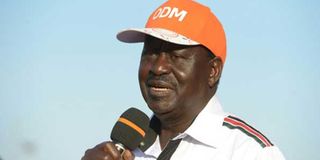Raila’s legacy as rights crusader intact

Mr Raila Odinga
What you need to know:
- And what might make it even more painful is that he has been beaten for the second time in a row by the much younger rival he first under-rated as a walkover.
For the fourth time in 20 years, Mr Raila Odinga has failed to achieve his ultimate dream— assuming the Presidency.
And what might make it even more painful is that he has been beaten for the second time in a row by the much younger rival he first under-rated as a walkover.
As President Uhuru Kenyatta embarks on a second term, the man who can rightfully claim credit for helping make it all possible through a lifelong struggle for democracy is looking at the prospects of bowing out with one unfulfilled ambition. As he ponders his latest loss, Mr Odinga has to reconcile himself to the stark reality that at 72, he may never vie for the presidency again, unless a petition to the Supreme Court gives him another chance.
He entered the contest this year aware that this was a last-ditch effort with time not on his side.
And as part of the deal by which he secured presidential nomination for the National Super Alliance, the Orange Democratic Movement leader had to promise that win or lose, he would not offer himself for the presidency at the next elections in 2022.
This means that even had he beaten President Kenyatta and made it to State House, President Odinga would have served only one term and then handed over the baton to his deputy Kalonzo Musyoka.
And if he did not win, he would still step aside and let Mr Musyoka, the Wiper party leader, step up to the plate.
It should thus be certain that if he keeps to his word, Mr Odinga will be riding off into the sunset looking back whimsically, and maybe with a sense of betrayal, at what might have been.
Having lost twice to Mr Kenyatta might be particularly painful when he looks back not just at his own years of struggle and sacrifice, but to a generation before him.
Mr Odinga can rightfully say that he dedicated his life to the struggle that brought to an end the one-party Kanu dictatorship and gifted Kenyans the era of human rights and democracy that allowed them to vote in leaders of their choice.
When he was suffering detention, torture and exile for the cause, young Uhuru Kenyatta was enjoying the fruits of the dictatorial regime; and Mr Mwai Kibaki was infamously proclaiming that “a mugumo tree (read Kanu) cannot be cut down with a razor blade”. When the single-party edifice collapsed at the end of 1991, former Vice President Kibaki who had remained in Kanu through the struggle for democratisation, swiftly shifted to the opposition. When the best opportunity presented itself in 2002 to uproot the monolith, it was Mr Odinga who destroyed Kanu from within.
He used a brief flirtation with the then ruling party to engineer a rebellion against outgoing President Daniel arap Moi’s handpicked successor, Uhuru Kenyatta, and then led decamping troops into backing Kibaki’s presidential candidacy under the united opposition banner. That was the second time an Odinga had put aside his own and his community’s aspirations to back a Kikuyu for president.
It started with Raila’s father, Jaramogi Oginga Odinga, turning down entreaties to take up the leadership mantle at the dawn of independence in the early 1960s in favour of Uhuru’s father, Mzee Jomo Kenyatta. Freedom was attained in 1963 with Jomo Kenyatta as Prime Minister, eventually president, and Oginga Odinga as his deputy. The Kikuyu-Luo alliance under Kanu lasted only three years as ideological differences drove Mr Odinga out of Kanu in 1966 to launch the Opposition Kenya Peoples Union.
He became the father of opposition politics and in 1969 was thrown into President Kenyatta’s detention camps. He was reduced to a political non-person even after release and remained shunted aside even after President Kenyatta died in 1978 to be succeeded by Daniel arap Moi.
His son and political heir, Raila, first came to public attention in 1982 when he was arrested and then detained without trial in the wake of an abortive military coup attempt.
Raila’s four failed presidential bids will certainly be a blot on his legacy, especially in a society where the presidency is exulted to divine status.
Yet, being the politician the country has seen in the last two decades, it would be premature to write him off entirely. He may never contest the presidency again but his capacity to pull strings from behind the scenes cannot be underrated. As leader of ODM he controls the biggest partner within the Nasa coalition and indeed one of the largest and best-established political parties in the country. Mr Odinga might also play a pivotal role in keeping Nasa together amidst also certain jostling for leadership between Mr Musyoka and Mr Mudavadi who will both be eyeing the 2022 ticket. Outside local politics, Mr Odinga could easily take his place as a respected elder statesman in Africa.
Mr Oruko and Mr Gaitho filed this analysis for NMG from Nairobi



